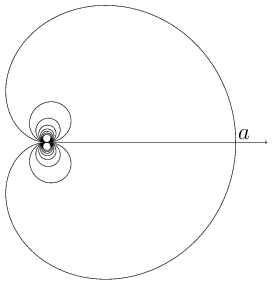Difference between revisions of "Cochleoid"
From Encyclopedia of Mathematics
(TeX encoding is done + figure (is it ok?)) |
m |
||
| Line 16: | Line 16: | ||
====References==== | ====References==== | ||
<table><TR><TD valign="top">[1]</TD> <TD valign="top"> A.A. Savelov, "Planar curves" , Moscow (1960) (In Russian)</TD></TR></table> | <table><TR><TD valign="top">[1]</TD> <TD valign="top"> A.A. Savelov, "Planar curves" , Moscow (1960) (In Russian)</TD></TR></table> | ||
| − | |||
| − | |||
| − | |||
| − | |||
| − | |||
| − | |||
| − | |||
<table><TR><TD valign="top">[a1]</TD> <TD valign="top"> J.D. Lawrence, "A catalog of special plane curves" , Dover, reprint (1972)</TD></TR></table> | <table><TR><TD valign="top">[a1]</TD> <TD valign="top"> J.D. Lawrence, "A catalog of special plane curves" , Dover, reprint (1972)</TD></TR></table> | ||
Revision as of 12:15, 8 September 2013

Figure 1. The cochleoid (pdf)
A plane transcendental curve whose equation in polar coordinates is \begin{equation} \rho = a\frac{\sin\varphi}{\varphi}. \end{equation}
The cochleoid has infinitely many spirals, passing through its pole and touching the polar axis (see Fig.). The pole is a singular point of infinite multiplicity. Any straight line through the pole $O$ intersects the cochleoid; the tangents to the cochleoid at these intersection points pass through the same point.
References
| [1] | A.A. Savelov, "Planar curves" , Moscow (1960) (In Russian) |
| [a1] | J.D. Lawrence, "A catalog of special plane curves" , Dover, reprint (1972) |
How to Cite This Entry:
Cochleoid. Encyclopedia of Mathematics. URL: http://encyclopediaofmath.org/index.php?title=Cochleoid&oldid=30440
Cochleoid. Encyclopedia of Mathematics. URL: http://encyclopediaofmath.org/index.php?title=Cochleoid&oldid=30440
This article was adapted from an original article by D.D. Sokolov (originator), which appeared in Encyclopedia of Mathematics - ISBN 1402006098. See original article